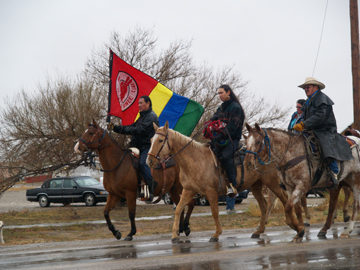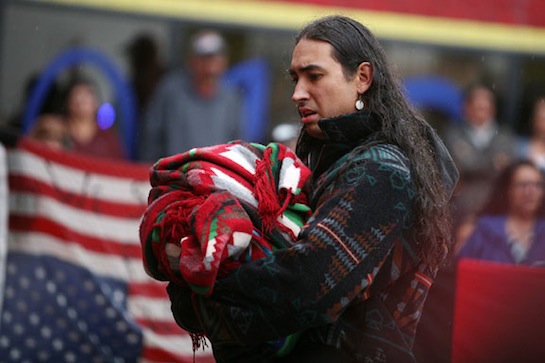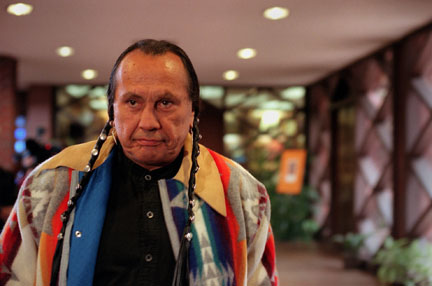
Family and friends of Russell Means, including son Tatanka Means, center, led his funeral procession on horseback along the Big Foot Trail from Means’ ranch near Porcupine to Little Wound School in Kyle as part of an all-day ceremony Oct. 24 honoring Means’ life. JESSE ABERNATHY, NSN STAFF

Tatanka Means, Russell Means’ son, carries an urn with Means’ ashes into Little Wound High School in Kyle on Wednesday, Oct. 24. COURTESY/RAPID CITY JOURNAL, AARON ROSENBLATT

Russell Means leaves a meeting with Denver clergy who mediated peace when American Indian activists planned a protest of the city’s Columbus Day parade in October 2000. COURTESY/THE DENVER POST, HYOUNG CHANG
Hundreds gather to remember Russell Means
Three more ceremonies set for next year
By Jesse Abernathy
Native Sun News Editor KYLE — “The first thing about freedom is: You are free to be responsible.” This is the self-declared mantra by which longtime indigenous rights activist Russell Charles Means lived his life. After contending with esophageal, or throat, cancer for just over a year — at one point declaring he had “won the battle, man” — the 72-year-old made his journey to the spirit world early on the morning of Monday, Oct. 22, at his ranch near Porcupine on the Pine Ridge Reservation. Means, who was Oglala Lakota and was also an actor, author, multimedia producer, community organizer, musician and one-time U.S. presidential candidate as well as an Oglala Sioux Tribe presidential candidate in 2004, was just weeks shy of his 73rd birthday on Nov. 10. His funeral service was held Wednesday, Oct. 24, at the Little Wound High School auditorium in Kyle, with close to 500 people in attendance. The service, which was deemed an honoring ceremony by his family, was a day-long celebration of Means’ life and the impact he had in a career that spanned six decades and was essentially ignited by his high-profile role in the American Indian Movement’s 71-day occupation of the Pine Ridge Reservation hamlet of Wounded Knee in early 1973. The site is where over 300 mostly defenseless Lakota men, women and children were slaughtered by white soldiers with the U.S. Army’s 7th Cavalry Regiment on Dec. 29, 1890. Wounded Knee’s significance was the focal point of AIM’s takeover, symbolizing centuries of injustice against the nation’s indigenous peoples at the hands of the U.S. government. Beginning at approximately 10 a.m. on Oct. 24, several members of Means’ family, including sons Scott and Tatanka, as well as several friends symbolically led on horseback the long funeral procession of cars along the Big Foot Trail, which marks the final path taken by the Lakota chief and the men, women and children who perished at Wounded Knee Creek, or Cankpe Opi Wakpala, in 1890. Some three hours after their journey began, the horseback riders, along with mourners, converged in front of Little Wound School, where piercing tremolos in honor of the fallen Lakota warrior reverberated through the cold, rainy and solemnly respectful air as Tatanka Means quietly carried his father’s ashes into the school’s auditorium. A riderless horse, said to carry Means’ spirit, was among the horseback riders leading the procession. Russell Means’ cremated remains were carefully placed by his son in a tipi at the front of the auditorium, just in front of the several rows of seats where close family members had gathered. Two young Lakota men kept silent vigil over the entrance of the tipi throughout this initial session of the celebration of Means’ life. Family members had Means’ funeral program imprinted with his Lakota name — “Oyate Waciyanpi,” which translates as “The People Depend On Him.” Mourners came from near and far to pay their respects to the man who accomplished much in calling attention to the plight of the nation’s first peoples as the “forgotten race.” “I remember Russell used to say he didn’t want to be buried, he wanted to be cremated,” Means’ younger brother, Bill Means, recalled in opening the ceremony. “That way, Russell said anthropologists and scientists couldn’t dig him up so that cops could stick more (criminal) charges on him.” A wave of quiet laughter coursed through those in attendance upon hearing the opening of Bill’s eulogy. Russell Means was the eldest child in his family. Richard Marshall, a lifelong friend of Means, recalled a young and brash but confident Means during the height of AIM in the 1970s. Marshall delivered the majority of his eulogy in Lakota. Chief Leonard Crow Dog, Sicangu Lakota (Rosebud Sioux) medicine man and spiritual leader, spoke next, delivering a good portion of his eulogy in Lakota as well. Crow Dog praised Means for a lifetime of accomplishments as a defender of Native American rights. And just before the afternoon meal was served at 2 p.m., Oglala Sioux Tribe President John Yellow Bird Steele took the microphone, telling Means’ family “how sorry I am that you lost Ted (Means) and now Russell,” his voice shaking with emotion. Ted Means, another one of Russell’s brothers, died almost one year ago. Tom Poor Bear, OST vice president, told The Associated Press that Means “gave us courage to stand up for what we believe in and to be proud of who you are.” The service for Means continued into the evening, ending around 10 p.m., some 12 hours after it had begun. On Thursday, Oct. 25, Means’ ashes were scattered by his family across the sacred Paha Sapa, or Black Hills. In recognition of the sanctity of the number four among the Lakota, Dakota and Nakota people, three more ceremonies honoring the life of Russell Means are planned for next year. The second will be held at the Wounded Knee 1973 Occupation Memorial on Pine Ridge in February 2013, followed by a third at Wind Cave National Park near Hot Springs in the Paha Sapa in June 2013 and a final ceremony on Means’ birthday, on Nov. 10, 2013. The location for the final honoring ceremony has not yet been determined. The number four signifies, among other things, the four seasons and the four directions as both connected and represented by a circle. “Young people and Indian people need to know that we existed in the 20th century,” Means once said. “We need to know who our heroes are and to know what we have done and accomplished in this century … .” Indeed, Russell Means as a defender of Native American rights has been one of his most impactful accomplishments and will perhaps be his most enduring legacy. (Contact Jesse Abernathy at editor@nsweekly.com)
Join the Conversation